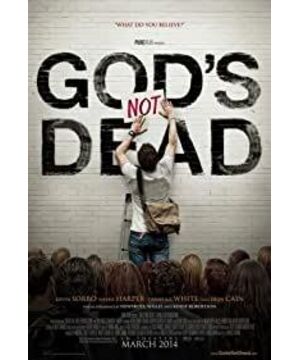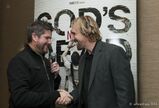tries to prove "God is not dead" in two ways. One is through the debate between a college student and a philosophy professor, and the other is through the experience of believers and pastors. That is to say, one is through theory and the other is through practice. Such an idea is obviously quite remarkable. Did the movie actually realize this idea?
1. Religion means belief (the art of language)
Because the debate part is more discussed, so let’s talk about practice first. Of course, there are many plots designed in it, here we focus on two parts.
The first is two things related to the positive character Reverend Martin.
The protagonist Wheeler, a freshman, is a devout Christian who takes a philosophy course. The professor asked the students to sign "God is dead". He insisted not to sign, so the professor asked him to prove in class that "God is not dead." He felt so stressed that he went to church, but sat for a long time without feeling God's support. At this time Father Martin came. Ask Wheeler, "Do you need help? Are you waiting for someone?" Wheeler said, "Yes, you can say that. It looks like he's out at this moment." Martin replied, "Okay, then Maybe that's why He sent me." When we need God, it's true that He doesn't show up. The question is if someone comes out to help, then why can't it be said to be God's arrangement? So, this neatly answers Wheeler's question, as well as the "atheist" or "confused believer" question.
Then there was another incident. Father Martin himself and his friends were going to Florida, but it was very strange that his car could not start; what was even more strange was that the rental car he called also did not start. Finally, when he was about to set off again, his companion had this conversation with him. Martin: "Why should I bring my suitcase?" Friend: "Not having it shows your lack of faith. Oh dear Father, please make this car start! Amen!" Martin wondered : "That's it?" Friend replied: "Why, do you have a better blessing than 'Lord, please make this car run'?" Martin: "No." Friend: "Then, let's try Come on." Martin replied "yes", but instead of taking his luggage, he walked to the cab by himself. The friend objected: "No, no, ... put our luggage in the trunk first. David, we have used our entire lives to practice the faith. Now, I want you to show your faith." Well, after entering the car, the car actually started. It was the original car. This story is also very convincing. As a priest, Martin himself does not believe in the existence of God in real life, but believes in the existence of science: the car is broken, so it has to be repaired, and it is impossible to rely on God. This is a very real thing, and that's true for priests, not to mention others. The problem is that his friend made him understand that in fact, he has always claimed to be "justified by faith", but he has not put faith in every moment. This is naturally like Martin citing the Bible to teach Wheeler: Whoever is in front of people Whoever acknowledges me, I will also acknowledge him before my Father who is in heaven. Whoever denies me before men, I will also deny before my Father who is in heaven. How can God help you? Therefore, this case, obviously and very subtly, guides us to think in a "logical sequence": I don't believe in God, so God doesn't exist (don't help me when I need it); or God doesn't exist, so I Do not believe in God. And the conclusion is naturally: as long as I believe in God all the time, God will naturally protect me all the time. Of course, this also points out the key to religion: Faith, Faith!
The second is the story of Shelley, the villain's successful investor. It involves Shelley's conversation with journalist girlfriend Amy, as well as his conversation with his mother. Of course, these two conversations have to be analyzed together.
After Amy said she had cancer, Shelley not only offered no comfort, but instead offered to break up immediately. Below is their conversation.
Shelly: "Can't wait until tomorrow?" Amy took a hit and said, "What? How can you say that about me? I think you love me." Shelly: "Yes, but you Changed our agreement. You broke our agreement." Amy: "You made it sound like a contract negotiation." Shelly: "So, what do you think it was?" Amy: "I think It's love." Shelly: "Grow up, Amy. Love is the most abused word in the English language. We say it when we want something, and you too when we need something. Should feel as guilty as everyone else (for breaking a pact of interest) is. We had a lot of fun together. You're my crazy, young girlfriend, and a fancy job. I'm your guide to high society, glamorous , successful boyfriend. We're together because we get what each other wants in this relationship. It's good, actually, quite satisfying. But that's all over now." Amy: "Why didn't I find out who you are?" Shelly: "Because you only see what you want to see." Amy: "Do you understand that I might die?" Shelly: "All I can say is, I'm sorry about that."
Shelly finally looked at her mother after her sister's reminder. Then Shelly looked at her mother in the corner and said with deep emotion, "Throughout your whole life, you've prayed and believed, never done anything wrong, and here you are. You are what I know. The best person in my life, and I am the worst. You have Alzheimer's, but my life is perfect. Please explain it to me." Unexpectedly, the dementia mother answered him: "Sometimes, the devil allows people A carefree life because it doesn't want people to turn to God. Your sin is like a prison cell, otherwise it's nice, comfortable, and there doesn't seem to be any need to leave. The door is open, and one day, the time will come , the narrow door slammed shut, and suddenly...it was too late. Who do you say you are?"
Indeed, Shirley represents many modern people who have no faith, or only talk about "reason of interests" and not "emotions". They don't need religion, they don't need morality, they don't believe in feelings, they only believe in transactions. They are alive and well, even without disaster or disease. What are they afraid of? In fact, as he himself always emphasized, everyone has to go through something. Could he not experience aging, disease, or face the fear of "death"? At this time, he needs to rely on religion, but he has always been close to the "devil", does he have the confidence to enter God's heaven? These two dialogues not only allow us to understand some problems that cannot be solved by God alone, because the devil is still in the way; it also allows us to understand that God's door is always open for us, but we foolishly give up.
The content of the above two parts, according to my understanding, should be collected stories, dialogues or revelation given by priests, and have a realistic basis. And importantly, we can see a problem: in fact, religion, like science, has a very powerful "explaining power". Understanding this is that I often argue with my mother over "superstition" issues. Then I discovered that the "superstitious ideas" represented by my mother can actually understand everything in the world, even though it is absurd in our eyes. Therefore, we must have a rationality, a real rationality: there is only one world, but there are many beliefs. We must respect the beliefs of others, and not be foolish enough to convince them.
2. Debate Skills
The first time I saw this movie, I was thinking about a question, what would happen if I came to debate. And then I thought, is there any real debate in the world?
Because the thesis alone has a lot to consider conceptually. First, the God of nature, the God of morality, or the God of human form. Every man has a God in himself. Second, "not" is the definition of time. Is God in time? According to religion, or according to modern language, God is not limited by time and space, and his essence is more like "light". "Death" is the definition of nature, and if it is "existence", then "spiritual death"? In addition, "God" is a concept of "religious meaning", no matter what religion it is, polytheism or monotheism, does a humanized God exist?
Putting aside the concept, the decision of the right and wrong of the debate often lies in the technique of the debate, rather than the point of the debate itself. Therefore, Zhuangzi advocated that "there is no victory in debate", saying: Even if I were to argue with Ruo, if I were to defeat me, I would not be able to defeat me, and if so? Am I also evil? If I win, if I don't win, then what am I? And if it's not evil? It or also? Is it evil or not? All of them are also? Are they all evil?
Moreover, any debate is carried out in the "middle zone" between the two viewpoint systems, so there must be a "common language". Of course, a real "common language" is difficult to exist. However, when we debate, we try our best to rely on this aspect and try our best to find a common language to communicate. Because the expression itself naturally contains positions and concepts, when we look at the debate between the two viewpoints, we must look for a common "debate language", or to be more precise, "debate technology".
Lao Tzu said: The good do not argue, and the debate is not good. It is because the debate naturally falls into a kind of dependence on technology and greed for victory and defeat, which ultimately affects the truly objective, fair and reasonable concept. Let's turn to the debate now. First of all, I would like to remind everyone that we must try our best to remain neutral, that is, to abandon our original position of "being and atheism". We just observe its debating technique.
The debate in the film has three parts, between philosophy professor Radisson (hereafter referred to as R), and his student Wheeler. Radisson hated God and refused to believe in religion because of the loss of his mother as a child. Wheeler (F) is a young, hopeful student and a devout religious believer.
R begins with a list of thinkers (Michel Foucault, Bertrand Russell, Ludwig Feuerbach, Bertolt Brecht, Friedrich Nietzsche, Ann Rand , George Santayena, Democritus, Diderot, David Hume, John Mueller, Albert Camus, Richard Dawkins, Sigmund Flore Ide, Dr. Noam Chomsky (Michel Foucault, Bertrand Russel, Ludwig Feuerbach, Bertolt Brecht, Friedrich Nietzsche, Ayn Rand, George Santayana, Democritus, Denis Diderot, David Hume, John Stuart Mill, Albert Camus, Richard Dawkins , Sigmund Freud, Noam Chomsky.) What they have in common: Atheists. Then, again: God is dead. Of course, this is a metaphor, but in an illustrative sense, not that God is dead. He Never existed in the first place, just beyond what our ancestors could have imagined. He was a useful fairy tale in times past, his wrath was used to explain the occurrence of plagues, and crop failures, diseases and disasters that we have now Blame it on bacteria and viruses, chromosomal diseases, and plate tectonics. In short, it's science and rationality that replace superstition, and it's all better.
(Su comment: It's clear that the professor's debate here is flawed, in fact, almost all debates All can find such "technical" loopholes. No matter how many scientists point out that God is dead, it is useless, just like Einstein refuted the 100 physicists who opposed the theory of relativity: it is enough to overthrow the "theory of relativity" one Yes. Of course, we still like this, just like we often come up with silly words like "How are N academicians?". Another point of view, which points to reality, but is a "belief-based" theory, because in In the hearts of religious believers, the wrath of God can still be used to explain disasters, because human beings are indeed becoming more and more excessive, and there are really many disasters now.)
Radisson asked students to sign "God is Dead" so he wouldn't waste time discussing issues involving religion in class. In fact, his purpose is very clear to ensure that his students are all atheists. This should also be the common intention of many scientists themselves, because science is their belief. But one student, named Wheaton, who was a devout religious believer, refused. Therefore, the professor should ask him to provide evidence and argue with him in future classes.
1. The first debate: the beginning of the universe (God or the Big Bang)
H: Atheists say that no one can prove the existence of God. Yes, they are right. But I mean: no one can refute the existence of God. The only way to debate this issue is to look at the available evidence, and that's what we're going to do. In judging God (existence), Professor Resendi is the prosecutor, I am the defense attorney, and you (referring to the other students) are the jury.
(Su Comment: The beginning is right. Because this is a rational point of view. Empty arguments or different positions are difficult to convince each other, so we must pay attention to the evidence that everyone can accept)
Most cosmologists agree that we The universe originated 13.7 billion years ago in what is known as the Big Bang. So, let's take a look at theoretical physicist and Nobel Laureate in Physics Stephen Weinberg's description of the "Big Bang". And because he is an atheist, we can be sure that there is no religious inclination in his description. "In the beginning there was a big bang, and in the first 3 minutes, 98% of the matter in the universe was formed. We have a universe that is 2,500 years old. Most scientists agree with Aristotle that a stable-state universe has always existed, with no beginning and no end. But the Bible disagrees with this view. In the 1920s, Belgian astronomer Georges Lemaitre, who was actually a theist. What is a theist? Theists are those who believe in the existence of God. He said that the entire universe was born out of the sky, and in a trillionth of a trillionth of a trillionth of a second, an intense flash of light from nothingness to inconceivable was emitted. This is his answer to the formation of the universe. If God does command "Let there be light," as in Genesis 1:3, in other words, the origin of the universe begins to emerge. After reading Genesis, it is indeed as stated above. For 2,500 years, the Bible has always been correct, but science has been wrong.
... (insert some other characters and events in the middle, which means that the screenwriter omits other arguments)
(Su Comment: Here, Wheaton's purpose is to use the similar discussion of the two scientists to compare the "big bang" with "God said there should be light, So create the universe” is equivalent, and the beginning is “God did.” And this proves the existence of God. The problem is that the two are not actually the same expression. Especially in language, it is like China People shake their heads like Indians, but we shake their heads in denial, while Indians shake their heads in affirmation. The "big bang" view is only a view of the origin of the universe that is relatively recognized by the scientific community, but it is not the real origin of the universe. That's it. But the effort and direction of scientists must have a "starting point", even if we can never keep up with this starting point. This is different from the religious point of view. The "Bible" emphasizes that God is "the beginning", but In order to avoid answering the question of "where did God come from", religious believers point out that God has always existed and originally existed. Therefore, the religious point of view is that there is no "initial". Of course, this is a "self-contradictory". Conclusion. The foundation and purpose of the theory of theists and atheists are different. Therefore, Wheeler is actually using a method of "confusion of concepts". In addition, Wheeler points out that the universe has a history of 2,500 years, and also emphasizes that " The Bible has always been correct. It is true that science advances in error, but the Bible does not have much room for "advancement", and it can be tampered with constantly. So naturally it cannot be called "correct". And 2500 years ago, China has a recorded history Not only for such a short period of time, not to mention the history of mankind, the history of the universe. This is a big fallacy in itself. So Wheeler is using the "imposed opinion" method here.)
All of this points to a God who created it (universe). You see, in the real world, we never see things come into existence from nothing, but atheists want to make small exceptions to the rule that the universe and everything on it exists.
Richard Dawkins said in his book "The God Illusion": "If you tell me that God created the universe. Then I have the right to ask you, who created God?" Dawkins The issue must be meaningful in "Who created a God", which is not true for the God that Christians believe in - "the God who was not created" meaningful. Even substituting God in the equation, I have the right to return Mr. Dawkins' question to him and ask him: If the universe created you, then who created the universe? You see, both theists and atheists have the same problem. Regarding the origin of matter, I hope you can realize that you don’t need to kill off your innate knowledge before you believe in the creation behind the Creator. To the extent that you don't allow for God at all, you'll have a hard time finding a compelling alternative explanation: How did matter come to be?
(Wheeler here cleverly uses the "self-contradiction" method I mentioned earlier. In fact, the scientific atheism also has a "self-contradictory" place, that is, "Since you believe that there must be a starting point, Then why can't that starting point be God?" Because the understanding that science has discovered so far is still far from the truth, but if you believe that there is truth, why can't God be that truth?)
R: Okay, I can imagine that you are very satisfied with what you just said, I see that you are careful to avoid this guy Stephen Hawking, the most famous scientist in the world, and he is not a theist, came out recently, Proposes "a self-designed universe". (H: I didn't shy away, I just didn't...) You just don't know about it. Well... well, let's take a look at Professor Hawking, the "Lucas" Professor of Physics at Cambridge University, who occupies the top teaching chair once held by Sir Isaac Newton, (he naturally) must not Not to mention the origin of the universe. Well, I quote (his statement): "Because of laws such as gravitation, the universe can and may arise from nothing, forming spontaneously. Spontaneous creation can be explained as: there is no nothing in the universe, it is the reason why the universe exists and we exist. There is no need for God to make the universe work." ("Because there's a law such as gravity, the universe can and will create itself from nothing. Spontaneous creation is the reason there is something instead of nothing. It's why the universe exists, why we exist. It is not necessary to invoke God to set the universe in motion.") end of quote.
Well, you may never find his argument, but his point remains. How do you answer?
(Actually, according to Hawking's remarks quoted by Radisson (comparable to "Grand Design"), it is obvious that Hawking is just learning the way of religious believers, and understands the "original" problem as: the universe exists naturally and has always been Indian Buddhism also believes that "Buddha is the meaning of Tathagata, and Tathagata is originally, always and forever", and Chinese Taoism's "the beginning of the nameless world, the mother of the famous world" is the same. Here we are One problem can be clarified: religious believers and scientific believers use the same method of debate, but their beliefs are different.)
H: In the last class, I was asked a question. At the time I couldn't answer, and Professor Resendy pointed out that Stephen Hawking was an atheist. He also wrote a book called The Grand Design. He said this in the book: Because of the laws of gravity and other laws, the universe can and will come into being from nothing and form spontaneously. And to be honest, at the time I didn't know how to counter this. I mean, after all, Hawking was a genius. However, Professor Lan John (teaching at Oxford University) who teaches mathematics and philosophy has analyzed that there are not only one, but even two or three logical errors in that simple sentence. And these are all based on circular arguments only. Hawking is basically saying that the universe exists because the universe needs to exist, and because the universe needs to exist. Therefore, it creates itself. For example, if I tell you, I can prove that luncheon meat is the best food ever, because no food has ever tasted better in history. You might look at me oddly and say I haven't proven anything. And you said it was right. Everything you say and do is just restating your original claim. Hawking claimed that the universe created itself because it needed to create itself, and then proposed why and how it created itself. We wouldn't immediately admit that he was doing the same thing, but he was. In this regard, Lan made a further analysis: "nonsense is still nonsense, even if it is spoken by famous scientists, even if the general public mistakenly thinks these are scientific conclusions."
(In fact, non-professional, even professional linguists, logicians It's easy to make mistakes in specific expressions. Because we are human beings after all, and we are people who grow up and live in the secular world. Short-term scientific language training is difficult to counteract the subtle non-scientific expressions. And this is only Hawking's In fact, Hawking's point of view has also undergone some argumentation. Of course, we also talked about it earlier, this is not the point, the point is Hawking's conclusion, which is actually the same as the way religion avoids "initial".)
R : This is too arrogant. Are you trying to say that you, a freshman, want to say that Stephen Hawking is wrong?
(Su Commentary: This is the so-called "appeal to authority" in debate. When there is no room for refutation, move out the authority.)
H: I didn't say it, it was Ran John who said it. A mathematics and philosophy professor who found Professor Hawking's reasoning wrong, and I agree with his logical arguments. But if you cannot bear to disagree with Hawking's ideas, then I suggest you turn to page 5 of his book, where he insists that "philosophy is dead", if you are so sure that Professor Hawking is infallible and that philosophy is really dead die. So good, this course is really unnecessary.
(Su Comment: Here, Wheeler is very clever. He used the most effective debate tool of "self-contradiction". However, specifically, here is actually "stealing concepts", because what Hawking said "Philosophy" is not a general philosophy, he pointed out that "traditional philosophy" lags behind "the development of physics". But in fact, Newton already included this kind of theory as physics in his book "The Mathematical Principles of Natural Philosophy". The ambition of the mathematician and the mathematician to seize the status of "traditional philosophy.")
According to the arrangement of the film, it is clear that Radisson loses here. Of course, it's not atheism that loses, it's Radisson's debate that loses. And as we analyzed earlier: at the beginning, this is the conclusion that two beliefs about different understandings of the universe inevitably lead to.
2. The second debate: the source of life (creationism and evolution)
H: Ladies and gentlemen of the jury, Darwinism has been saying for the past 150 years that God is unnecessary in explaining the existence of man, and evolution can replace God. But evolution just tells you what happened after life had it. So, where do living things come from? Actually, Darwin never really solved the problem. He assumed that lightning had just hit, some suitable chemicals. Great, a living life was born. But it's just not that simple. (Darwin clearly stated that the source of species is evolution. Although he did not point out the earliest species, scientists have now followed his direction and found the beginning: single-cell life. The birth of life as described by Wheeler The process has also been proven in the laboratory.) You see, Darwin claimed that the ancestors of all living things came from that single, simple organism that mutated over a long period of time to form the complex life we see now. These are the doctrines after his contemplation. Darwin's famous saying: "Natura non facit saltum." (Latin) means "Nature does not develop mutation". The famous (Christian) writer Strobel Lee pointed out: You can imagine a scenario where scientists have condensed the entire 3.8 billion years of history into one day, or 24 hours. By the last 90 seconds, most of the main existing animal shapes and groups of animals began to flash. Not the slow and steady (evolution) that Darwin predicted, almost instantaneously. (The argument here is obviously flawed. It is obviously quite absurd to argue against Darwin with a highly condensed expression of time as real time, and then to treat evolution as mutation. It is very long for us, this is our whole life. But we often use the flick of a finger to emphasize how fast time goes by. Decades can also be expressed with a flick of a finger, is it difficult to say that our Life is really short at the flick of a finger. So we still use "stealing the concept" here.) Therefore, "nature does not undergo mutational development" becomes "nature makes a giant leap". So how do theists explain this sudden, groundbreaking new biological message? God said, "Let the water multiply with living things, and let the birds fly above the ground and in the sky." (Genesis 1:21) God created big fish and all kinds of living animals that breed in the water. , according to their kind, and God saw that it was good. (Genesis:) In other words, creation happened because God said there was, It seems to us to be a blind, aimless process. In fact, from beginning to end, it is really God who is in control.
Obviously, the movie is to show two wins in three games, or even a complete victory. Not to mention that the freshmen present seemed to accept Wheeler's point very easily. As far as I know, the popularity of science in American high schools should not be so bad. As a university philosophy professor, no matter how bad it is, there is no room for refutation. Yes, he did not make any rebuttal to this, but after listening to it, he made another rebuttal.
3. The third debate: Does God love the world?
R: Lies, lies, and more lies. (H: It's easy to overlook, do you really not know? Or you don't want to know?) The answer should be there, a must-have for fanatical believers. Only if you open the Bible and read the Bible, then you will understand. These are the words of that brave, young freshman. "You are truly a people! When you die, your wisdom perishes" (Job 12:2). What else does Job tell us? "Man is born of a woman, and his days are few and many afflictions" (Job 14:1) "fly away like a shadow, and cannot remain" (Job 14:2 second half). Job 14:12) "until the sky is gone" (Job 14:12a) Well, at least he got that part of the rights. (Wheeler: What the hell happened to you?) When an old (boy) sees his cancer-stricken, dying mother. It is natural to beg God for the life of the mother. He turned to the phantom. Abba Father in heaven makes a wish. That includes loving and worshiping him forever. As long as he spares her. (Wheeler: Sometimes, the answer is no.) Tell me, what happens to you one day when you lose someone you love? She died believing that lie. She thought that when she died, there would be (God) there to love her. Even when her life was strangled by Him, what did she think. A God who allows this to happen is not worth trusting at all. That's why, Wheaton, you'll find out. The most staunch atheists were once Christians, and yet we all turn a blind eye to it. We see what the world really looks like. You see, Shakespeare was right, "Life is a dream, full of noise and commotion, but meaningless."
(Obviously this is the screenwriter's trick again. This so-called philosophy professor actually "appeals to sympathy". Because of the stupidity of his argument, I don't believe in the existence of God, because I begged him and didn't get what I deserved Answer, he turned his back on me, so I don't believe him. This would have been an illogical argument: since we can't say that medicine can't cure cancer, I don't believe in medicine.)
H: Sin, now, it is said" Sin" is the most powerful weapon for atheists to attack the Christian faith. However, it is. After all, existential sin brings up another problem. If God is all-good and God is all-powerful, how can evil be allowed? The answer at its core is very simple: "free will". God allows evil because of "free will". From a Christian point of view, God's tolerance of sin in this world is temporary, and one day those who truly choose to love him will live with him in heaven, freed from the tyranny of sin, and thus have virtuous free will. In other words, God's attitude toward sin is to destroy it one day.
(It is interesting that Wheeler does not directly refute here. Instead, it diverts another question, a question that is not a problem. God does not allow evil, because according to the Bible, God used a flood to punish the wicked. And In the future, the wicked will be judged by the Great Judgment at the end of the day. The argument is meaningless. Obviously, this is "avoiding the problem" and "avoiding the important". Because if God is merciful and loves the world, then at least his believers should be allowed to Away from disaster.
)
R: Good, so convenient. One day I will be free from all evil in the world. But until then, you just have to deal with all the wars, and massacres, tsunamis, poverty, hunger, AIDS, the good life. Next, he educates us through moral absolutes.
(Here, the professor's point of view is more sober. He points out that many disasters are not just for the wicked. What does that mean? This is the best argument against the existence of a benevolent God. Because kindness will not do that. For example, Africa Starving children, what can they be guilty of. Note that Christianity has no idea that the sin of the previous generation was punished! But, strangely, he himself turned to another issue: moral absolutes. Obviously this It's the writer who has to move the conversation to the destination as soon as possible.)
H: But, why not? Professor Resendi, who is clearly an atheist, does not believe in moral absolutes, but his core syllabus says he plans to test us in the final week. Now, I dare say that if I managed to cheat on an exam in order to get an "A," he would suddenly emphasize in a Christian tone, "Cheating is wrong." I should have known this, however, he on what basis? If I'm doing it to help me succeed, why shouldn't I do it? For Christians, the standard of morality, what is right and what is wrong, is a straight line that ultimately goes directly to God (responsible).
R: Oh, so you say, we need a God to be moral, it is impossible for an atheist to be moral.
(Ibid., the refutation here is sober. Because Wheeler's big loophole is that it is possible to have morality without believing in God. Just like China for thousands of years, it is bound by Confucian morality.)
H: No, but there is no God, Morality has no real meaning. I mean, there doesn't even exist a standard of moral conduct for Christians, lying, cheating, stealing. Take me as an example, I'm not allowed to steal a grade that is not my own earning credit, it's a form of theft. But if God does not exist, Dostoevsky famously said: "If God does not exist, man can do whatever he wants." Although it is possible to do anything, it is meaningless. If Professor Resendi is right, then everything, all our struggles, our debates, whatever we decide here, is meaningless. I mean, our lives and our deaths are no better than goldfish going there. This is ridiculous.
R: So, after all your discussion, all of this you say comes down to this: choose to believe or not. (Here the professor made a big mistake again. He did not refute at all: since there is no religion, there can be morality. Even if there is no morality, even if morality is lost, we still have the law. It is impossible for people to act arbitrarily in life, then Will be abandoned by society. Similarly, without God and heaven, is there no meaning in human life to struggle? This is also absurd. So, here is the screenwriter trying to move to his own destination.)
H: Yes, that's what I want to say, and what I want to say happened, the only difference between your position and mine: that you take their choice. The title you asked them to choose was: "I don't believe it."
R: Yes, because I want to release them. Because religion is like... it's like a virus that parents pass on to their children, and Christianity is the worst virus. It slowly creeps into our lives when we are weak, sick, and helpless.
H: So religion is like a disease?
R: Yes. Yes, it infected everything. It is the enemy of reason.
H: Rational? Professor, you were irrational a long time ago. You're not taking a philosophy class here. It's not even an atheism class. What you teach is an antitheism class. It's not enough, you don't believe it yourself. You can still make us disbelieve with you. Why don't you admit the truth?
R: You just let them fall into your primitive superstition.
H: What I want is for them to make their own choices. That's what God wants (the reason for free will).
R: You don't know how much I enjoy your upcoming failure.
H: Oh, but who are you really hoping to fail with, Professor? Am I still God? do you hate god? This isn't even a problem. Well, why do you hate God?
R: This is ridiculous.
H: Why do you hate God? Please answer this question. You've seen the scientific arguments. Science supports his existence. You know the truth of the matter. So why do you hate him? Why? That's a very simple question, Professor. why do you hate god?
R: Because He took everything around me. Yes, I hate God. I just hate him.
H: How can you hate someone if they don't exist? Nothing has been proved. Maybe not. They can choose. Is God dead? Or is God not dead? God is not dead. (Because the professor was stupid, he forgot his logic and only had personal emotions. People are not grass and trees, so once emotions are involved in the debate, it will be bad. And those wise people are often too conceited, and their character is more likely to fall into "anger" Therefore, a word of "hate" actually means that he acknowledges the existence of God. So Yang said that in the end Wheeler's argument once again used "self-contradiction" and won. The problem is that the screenwriter has I reluctantly put it in a good debate. A professional debate will not be so stupid. As for the last, a group of college students all stood up and declared that "God is not dead" because of such a debate. To be honest, I may have been in my freshman year. So. The problem is that we lack logical thinking and only trust that vibe and feeling.)
View more about God's Not Dead reviews











